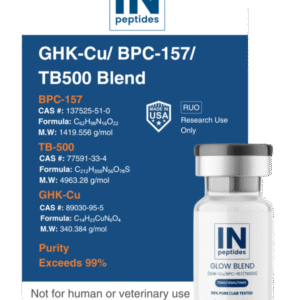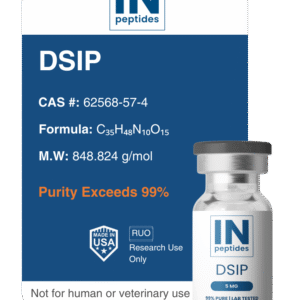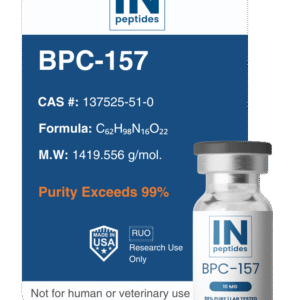Description
What Is GLP-2?
GLP-2 (Glucagon-Like Peptide-2) is a synthetic peptide developed for scientific exploration into blood sugar balance, appetite regulation, and metabolic efficiency. By activating key incretin receptors, it plays a role in insulin secretion, glucose metabolism, and energy regulation, making it a leading compound in endocrine and metabolic studies.
Mechanism of Action in Research
GLP-2 influences several pathways vital for metabolic control and glucose homeostasis:
- Dual receptor activation – Targets both GLP-1 and GIP receptors, supporting balanced insulin and glucose activity.
- Enhanced insulin secretion – Promotes glucose-responsive insulin release to improve energy regulation.
- Reduced glucagon output – Helps control hepatic glucose production, maintaining lower blood sugar levels.
- Slower gastric emptying – Prolongs satiety and regulates food intake in metabolic research models.
- Improved insulin sensitivity – Enhances glucose uptake and reduces resistance for better metabolic balance.
Potential Research Benefits
GLP-2 has shown promise across multiple scientific applications:
- Supports glucose metabolism and insulin dynamics
- Assists in weight and appetite regulation research
- Promotes metabolic balance and energy efficiency
- May reduce cardiovascular and metabolic complications
- Provides dual-action receptor benefits beyond single agonists
These properties make GLP-2 an innovative focus in diabetes and obesity research.
Scientific Applications
GLP-2 – 60mg is used in:
- Diabetes and metabolic function studies
- Insulin secretion and glucose regulation research
- Appetite control and weight management models
- Endocrine and incretin system investigations
Researchers value GLP-2 for its unique dual receptor mechanism, offering broader insights into metabolic health and glucose regulation.
Scientific Outlook
As research advances, GLP-2 continues to be a key peptide in metabolic science. Its combined activity on GLP-1 and GIP receptors opens new possibilities for understanding insulin efficiency, appetite suppression, and metabolic optimization. Ongoing studies aim to further define its role in long-term metabolic health and disease prevention.
For Research Use Only
Not for human consumption. Intended exclusively for laboratory and scientific research purposes.







Reviews
There are no reviews yet.